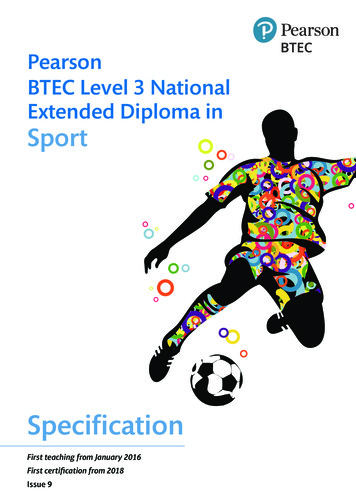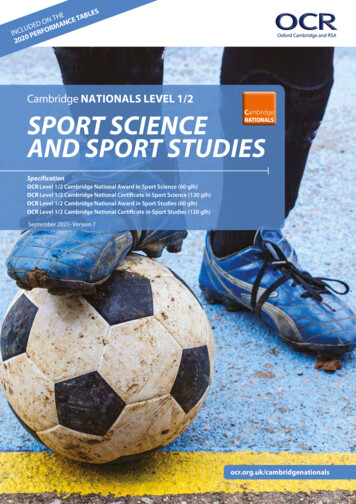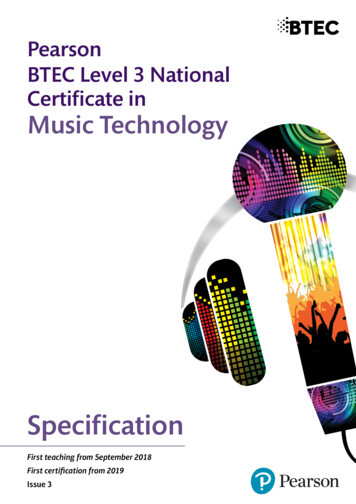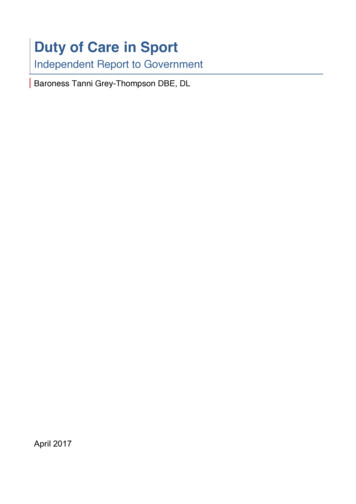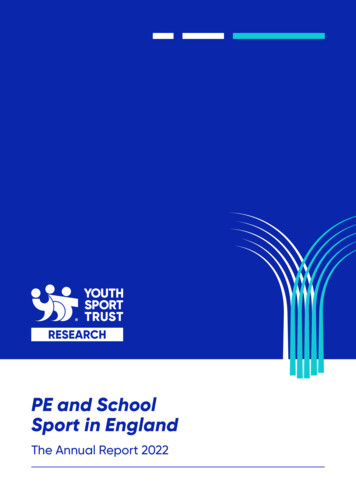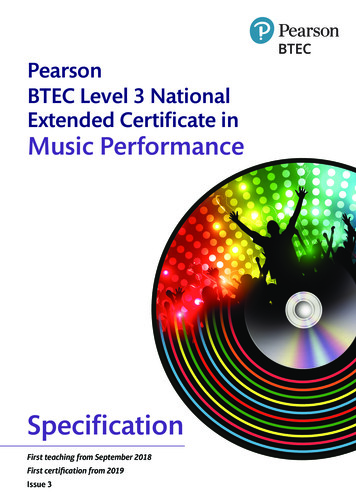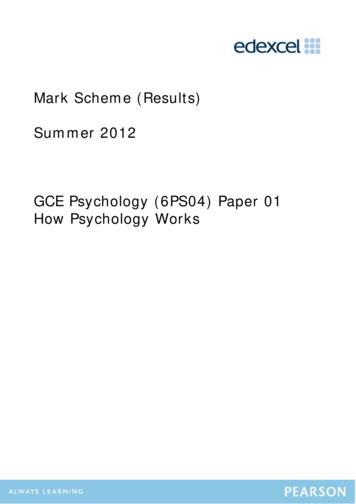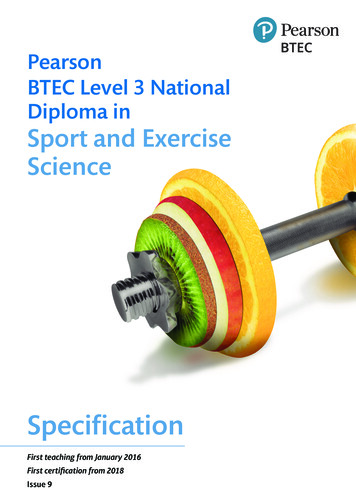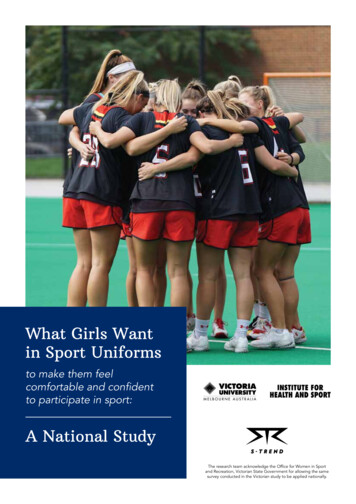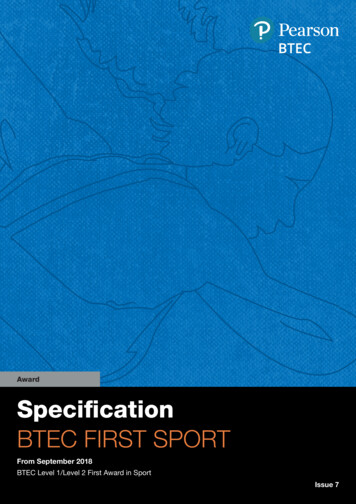
Transcription
AwardSpecificationBTEC FIRST SPORTFrom September 2018BTEC Level 1/Level 2 First Award in SportIssue 7
Pearson BTECLevel 1/Level 2First Award inSportSpecificationFirst teaching September 2018Issue 7
Edexcel, BTEC and LCCI qualificationsEdexcel, BTEC and LCCI qualifications are awarded by Pearson, the UK’s largest awardingbody offering academic and vocational qualifications that are globally recognised andbenchmarked. For further information, please visit our qualifications website atqualifications.pearson.com. Alternatively, you can get in touch with us using thedetails on our contact us page at qualifications.pearson.com/contactusAbout PearsonPearson is the world's leading learning company, with 35,000 employees in more than70 countries working to help people of all ages to make measurable progress in theirlives through learning. We put the learner at the centre of everything we do, becausewherever learning flourishes, so do people. Find out more about how we can help youand your learners at qualifications.pearson.comThis specification is Issue 7. We will inform centres of any changes to this issue.The latest issue can be found on our website.References to third-party material made in this specification are made in good faith.We do not endorse, approve or accept responsibility for the content of materials,which may be subject to change, or any opinions expressed therein. (Material mayinclude textbooks, journals, magazines and other publications and websites.)ISBN 978 1 446 93636 8All the material in this publication is copyright Pearson Education Limited 2020
Summary of Pearson BTEC Level 1/Level 2 First Award in Sportspecification Issue 7 changesSummary of changes made between the previous issue and thiscurrent issuePagenumberThe wording in Section 8 Internal assessment subsection Dealing withmalpractice has been updated to clarify suspension of certification incertain circumstances.Page 28The wording under Section 10 Awarding and reporting for thequalifications subsection Calculation of the qualification grade has beenupdated to clarify current practice in ensuring maintenance andconsistency of qualification standards.Page 35Earlier issue(s) show(s) previous changes.If you need further information on these changes or what they mean, contact us via ourwebsite at: qualifications.pearson.com
Welcome to your BTEC First specificationFor more than 25 years, BTECs have earned their reputation as well-established,enduringly effective qualifications. They have a proven track record in improvingmotivation and achievement among young learners. Additionally, BTECs provideprogression routes to the next stage of education or into employment.What are the key principles of BTEC Firsts?To support young people to succeed and progress in their education, BTEC Firsts havefour key design principles embedded.1 Standards: a common core and external assessmentEach Level 1/Level 2 BTEC First qualification has an essential core of knowledge andapplied skills. We have introduced external assessment appropriate to the sector. Thisprovides independent evidence of learning and progression alongside the predominantlyportfolio-based assessment.2 Quality: a robust quality-assurance modelBuilding on strong foundations, our quality-assurance model ensures robust support forlearners, centres and assessors.We will make sure that: every BTEC learner’s work is independently scrutinised through the externalassessment process every BTEC assessor will take part in a sampling and quality review duringthe teaching cycle we visit each BTEC centre every year to review and support your quality processes.We believe this combination of rigour, dialogue and support will underpin the validityof the teacher-led assessment and the learner-centric approach that lie at the heart ofBTEC learning.3 Breadth and progression: a range of options building on the mandatory units;contextualised English and mathematicsMandatory units, developed in consultation with employers and educators,give learners the opportunity to gain a broad understanding and knowledgeof a vocational sector.Optional specialist units focus more closely on a vocational area, supportingprogression to a more specialised Level 3 vocational or academic course or to anApprenticeship.Opportunities to develop skills in English and mathematics are indicated in the unitswhere appropriate. Where appropriate to the sector, learners will practise these essentialskills in naturally occurring and meaningful contexts.
4 Recognising achievement: opportunity to achieve at Level 1BTEC Firsts provide for the needs of learners who are aiming to achieve a Level 2qualification. However, we have recognised that for some learners, achieving thisstandard in all units within one to two years may not be possible. Therefore, thequalifications have been designed as Level 1/Level 2 qualifications, with gradesavailable at Level 2 and at Level 1 Pass.Improved specification and supportWe asked what kind of guidance you, as teachers and tutors, need. As a result,we streamlined the specification to make the units easier to navigate and haveprovided you with enhanced support in an accompanying Delivery Guide.Thank you
ContentsPurpose of this specification1Qualification title and Qualification Number21 What are BTEC Firsts?32 Key features of the Pearson BTEC First Award53 Pearson BTEC Level 1/Level 2 First Award in Sport94 Qualification structure135 Programme delivery14Resources14Delivery approach15Supporting the synoptic approach15Personal, learning and thinking skills15English and mathematics knowledge and skills166 Access and recruitment17Prior knowledge, skills and understanding17Access to qualifications for learners with disabilities or specific needs177 The layout of units in the specification188 Internal assessment21Language of assessment21Summary of internal assessment21Assessment and verification roles21Learner preparation23Designing assessment instruments23Authenticity and authentication25Applying criteria to internal assessments25Assessment decisions26Late submission27Resubmission of improved evidence27Appeals28Dealing with malpractice28Reasonable adjustments to assessment28Special consideration289 External assessment30Grade descriptors for the internal and external units3110 Awarding and reporting for the qualification3311 Quality assurance of centres3712 Further information and useful publications3813 Professional development and support39
Units41Unit 1: Fitness for Sport and Exercise43Unit 2: Practical Performance in Sport53Unit 3: Applying the Principles of Personal Training63Unit 4:The Mind and Sports Performance81Unit 5:The Sports Performer in Action89Unit 6:Leading Sports Activities97Annexe APersonal, learning and thinking skillsAnnexe BSynoptic assessment105105109109
INTRODUCTIONPurpose of this specificationThe purpose of this specification, as defined by Ofqual, is to set out: the qualification’s objective any other qualification that a learner must have completed before taking thequalification any prior knowledge, skills or understanding that the learner is required to havebefore taking the qualification units that a learner must have completed before the qualification will be awarded,and any optional routes any other requirements that a learner must have satisfied before the learner will beassessed, or before the qualification will be awarded the knowledge, skills and understanding that will be assessed as part of thequalification (giving a clear indication of their coverage and depth) the method of any assessment and any associated requirements relating to it the criteria against which learners’ level of attainment will be measured(such as assessment criteria) any specimen materials (supplied separately) any specified levels of attainment.Pearson BTEC Level 1/Level 2 First Award in Sport –Issue 7 – March 2020 Pearson Education Limited 20201
INTRODUCTIONQualification title and Qualification NumberQualificationtitlePearson BTEC Level 1/Level 2 First Award in SportQualificationNumber (QN)600/4779/3This qualification is on the Regulated Qualifications Framework (RQF).Your centre should use the Qualification Number (QN) when seeking funding foryour learners.The qualification title, units and QN will appear on each learner’s final certificate.You should tell your learners this when your centre recruits them and registers themwith us. Further information about certification is in our UK Information Manual on ourwebsite, qualifications.pearson.com2Pearson BTEC Level 1/Level 2 First Award in Sport –Issue 7 – March 2020 Pearson Education Limited 2020
INTRODUCTION1 What are BTEC Firsts?BTEC First Awards are primarily designed for use in schools as an introductoryLevel 1/Level 2 course for learners who want to study in the context of a vocationalsector. The knowledge, understanding and skills learned in studying a BTEC First will aidprogression to further study and, in due course, prepare learners to enter the workplace.These qualifications are intended primarily for learners in the 14–16 age group,but may also be used by other learners who wish to gain an introductory understandingof a vocational area. When taken as part of a balanced curriculum, there is a clearprogression route to a Level 3 course or Apprenticeship.BTECs are vocationally related qualifications, where learners develop knowledgeand understanding by applying their learning and skills in a work-related context.The qualifications are popular and effective because they enable learners to takeresponsibility for their own learning and to develop skills that are essential for themodern-day workplace. These skills include: teamworking, working from a prescribedbrief, working to deadlines, presenting information effectively, accurately completingadministrative tasks and processes. BTEC Firsts motivate learners, and open doors toprogression to further study and responsibility in the workplace.Objectives of the BTEC First AwardsThe BTEC First Awards will: enable you, as teachers, tutors and training providers, to offer a high-qualityvocational and applied curriculum that is broad and engaging for all learners secure a balanced curriculum overall, so that learners in the 14–16 age group havethe opportunity to apply their knowledge, skills and understanding in the context offuture development give learners opportunities to link education and the world of work in engaging,relevant and practical ways enable learners to enhance their English and mathematical competence in relevant,applied scenarios support learners’ development of transferable interpersonal skills, including workingwith others, problem solving, independent study and personal, learning andthinking skills give learners a route through education that has clear progression pathways tofurther study or an Apprenticeship.Breadth and progressionThis qualification has a core of underpinning knowledge, skills and understanding, and arange of options to reflect the breadth of pathways in a sector. This gives learners theopportunity to: gain a broad understanding and knowledge of a vocational sector investigate areas of specific interest develop essential skills and attributes prized by employers, further educationcolleges and higher education institutions.This suite of qualifications provides opportunities for learners to progress to eitheracademic or more specialised vocational pathways.Pearson BTEC Level 1/Level 2 First Award in Sport –Issue 7 – March 2020 Pearson Education Limited 20203
INTRODUCTIONProgression from Level 1This qualification has been designed to provide a progression route from the followingqualifications: Pearson BTEC Level 1 Introductory Certificate in Sport Pearson BTEC Level 1 Introductory Diploma in Sport.See our website, qualifications.pearson.com, for more details.4Pearson BTEC Level 1/Level 2 First Award in Sport –Issue 7 – March 2020 Pearson Education Limited 2020
INTRODUCTION2 Key features of the Pearson BTECFirst AwardThe Pearson BTEC Level 1/Level 2 First Award: is for learners aged 14 years and over is a Level 1/Level 2 qualification; the grades range from Level 2 P to Level 2 D*.Learners who do not achieve at Level 2 may be graded at Level 1. Learners whoselevel of achievement is below a Level 1 will receive an unclassified (U) result is a 120-guided-learning-hour qualification (equivalent in teaching time to one GCSE) has 25 per cent of the qualification that is externally assessed. Pearson setsand marks these assessments will be available on the Regulated Qualifications Framework (RQF) presents knowledge in a work-related context gives learners the opportunity to develop and apply skills in English andmathematics in naturally occurring, relevant contexts provides opportunities for synoptic assessment, see Annexe B for more detailedinformation.Learners can register for the BTEC Level 1/Level 2 First Award in Sport from September2018. The first certification opportunity for this qualification will be 2019.Total qualification time (TQT)For all regulated qualifications, Pearson specifies a total number of hours that itis expected learners will be required to undertake in order to complete and showachievement for the qualification: this is the Total Qualification Time (TQT).The TQT value indicates the size of a qualification.Within this, Pearson will also identify the number of Guided Learning Hours (GLH) thatwe expect a centre delivering the qualification will need to provide. Guided learningmeans activities that directly or immediately involve tutors and assessorsin teaching, supervising, and invigilating learners, such as lessons, tutorials,online instruction and supervised study.In addition to guided learning, other required learning directed by tutors or assessors willinclude private study, preparation for assessment and undertaking assessment when notunder supervision, such as preparatory reading, revision and independent research.Qualifications can also have a credit value, which is equal to one tenth of TQT,rounded to the nearest whole number.Pearson BTEC Level 1/Level 2 First Award in Sport –Issue 7 – March 2020 Pearson Education Limited 20205
Qualification size for BTEC First Award in the Sport sectorThe BTEC Level 1/Level 2 First Award for the Sport sector has the following values:First AwardGLHTQT120160Types of units within this qualificationThis BTEC First qualification may have mandatory and optional units, see Section 4Qualification Structure for more detailed information.Mandatory unitsMandatory units are designed to cover the body of content that employers and educatorswithin the sector consider essential for 14–16-year-old learners. They support theremainder of the learning needed for this qualification. There will be both internaland external assessment.Optional specialist unitsThe remainder of this qualification is formed of optional units that are sector specific.These focus on a particular area within the vocational sector, and provide an opportunityfor learners to demonstrate knowledge, skills and understanding.6Pearson BTEC Level 1/Level 2 First Award in Sport –Issue 7 – March 2020 Pearson Education Limited 2020
QUALIFICATIONPearson BTEC Level 1/Level 2 First Award inSportPearson BTEC Level 1/Level 2 First Award in Sport –Issue 7 – March 2020 Pearson Education Limited 20207
8Pearson BTEC Level 1/Level 2 First Award in Sport –Issue 7 – March 2020 Pearson Education Limited 2020
QUALIFICATION3 Pearson BTEC Level 1/Level 2 First Awardin SportWhat does the qualification cover?This course provides an engaging and relevant introduction to the world of sport.It incorporates important aspects of the industry, such as fitness testing and trainingfor sport and exercise, the psychology of sport, practical sports performance and sportsleadership. It enables you to develop and apply your knowledge, while also developinga range of relevant practical, communication and technical skills.The qualification is 120 GLH, which is the same size and level as a GCSE, is aimed ateveryone who wants to find out more about the sport industry.You will study three mandatory units, covering the underpinning knowledge and skillsrequired for the sports sector: fitness for sport and exercise practical performance in sport applying the principles of personal training.You will build on the knowledge gained in the mandatory units by choosing one furtherunit, covering areas such as: the mind and sports performance the sports performer in action leading sports activities.How will I be assessed?You will carry out tasks/assignments throughout the course. Your teacher will markthese, and so you will receive feedback as to how you are getting on.For the assessment for Unit 3 Applying the Principles of Personal Training, you will beable to draw on the knowledge, skills and understanding you have developed in thequalification as a whole.The assessment for Unit 1: Fitness for Sport and Exercise is an onscreen test which ismarked by Pearson.Where will this take me?If you are interested in taking your study of sport further, the subject-specific knowledgeand skills outlined above, and developed through studying this qualification, will give youa strong foundation for academic or vocational study at level 3, includingapprenticeships.What other subjects go well with sport?This qualification is designed to be taken as part of a broad and balanced curriculum atKey Stage 4. It will go particularly well alongside GCSEs in EBacc subjects (includingbiology), GCSEs in creative subjects (such as drama, music and art) and/or otherTechnical Awards (e.g. BTEC Health and Social Care, BTEC Business or Tech Award DIT)to provide both curriculum breadth and the skills you need to make informed choicesabout study post-16.Pearson BTEC Level 1/Level 2 First Award in Sport –Issue 7 – March 2020 Pearson Education Limited 20209
QUALIFICATIONThis course is different from the GCSE in PE, as, by taking part in different typesof sport and fitness activities, it gives you the opportunity to apply your knowledge,skills and the techniques you learn in practical ways, such as designing a personalfitness programme.How does this relate to other BTEC qualifications?The Pearson BTEC Level 1/ Level 2 First Award in Sport provides a generalintroduction to the sector, which enables you to acquire, develop and apply the skillsand knowledge required for further academic and/or vocational study.Pearson also offers larger sizes of the BTEC Level 1/Level 2 First in Sport aimed atpost-16 students.Where can I find out more?Further information about this qualification can also be accessed at:https://qualifications.pearson.comProvision for study in the Pearson BTEC Level 1/Level 2 First Awardin SportMandatory unitsThe mandatory units in this qualification ensure that all learners will develop: knowledge that underpins learning in other units in the qualification –Unit 1: Fitness for Sport and Exercise practical and vocational skills – Unit 2: Practical Performance in Sport synoptic knowledge, understanding and practical vocational skills –Unit 3: Applying the Principles of Personal Training.Optional specialist unitsThe optional units give centres flexibility to tailor the programme to the local area andgive learners the opportunity to pursue more specialist interests. These units may beselected to: extend knowledge and understanding developed in mandatory units:for example, in Unit 4: The Mind and Sports Performance, learners look at theconcepts that influence the mind in sporting situations and explore the effects thatthey can have on sports performancefor example, in Unit 5: The Sports Performer in Action, learners develop more in depthknowledge and understanding of the short-term responses and long-term adaptationsof the body systems to exercise, as well as how energy systems are used duringsports performance. develop general work-related skills:for example, in Unit 6: Leading Sports Activities, learners develop sports leadershipskills through delivering components of sports sessions and whole activity sessions.10Pearson BTEC Level 1/Level 2 First Award in Sport –Issue 7 – March 2020 Pearson Education Limited 2020
QUALIFICATIONAssessment approachThe Pearson BTEC Level 1/Level 2 First Award in Sport includes one externally assessedunit. This will help learners as they progress either into higher levels of vocationallearning or to related academic qualifications, by providing independent assessmentevidence of learning alongside the portfolio-based assessment.This approach will also assist learners in developing a range of transferable skills,and in applying their knowledge in unfamiliar contexts.The remaining units are internally assessed. Internal assessment enables learnersto develop a wider range of skills and provide evidence towards meeting the unitassessment criteria.Evidence for assessment can be generated through a range of activities, including writtenwork, practical performance and verbal presentations.Delivery strategies should reflect the nature of work in the sport sector by encouraginglearners to research and carry out assessment in the workplace, or in simulated workingconditions, wherever possible. It will be beneficial to learners to use local examples,wherever possible, and for your centre to engage with local employers for support andinput. This allows a more realistic and motivating basis for learning and can start toensure learning serves the needs of local areas.Learners should be encouraged to take responsibility for their own learning andachievement, taking account of industry standards for behaviour and performance.Synoptic assessmentThere is one internal unit, Unit 3, which provides the main synoptic assessment for thequalification. Unit 3 builds directly on Units 1 and 2 and enables learning to be broughttogether and related to a real-life situation.Unit 3: Applying the Principles of Personal Training requires learners to draw on andapply their learning of FITT principles and principles of training, and considerations forsafety to a designed and implemented fitness training programme.The design of the assessment criteria ensures that there is sufficient stretch andchallenge, enabling the assessment of knowledge and understanding at the end ofthe learning period.The assessment criteria require learners to demonstrate that they can identify anduse effectively an appropriate selection of skills, techniques, concepts, theories andknowledge from across the mandatory units in an integrated way. Assignments willsupport learners in drawing knowledge and understanding from across the qualification.Examples of this include implementing basic principles of training (FITT) to a fitnesstraining programme. Further examples are included in the Links to other units onpages 75-77.This assessment is assessed internally according to the regulations in Section 8.Additional guidance is provided in Annexe B.Pearson BTEC Level 1/Level 2 First Award in Sport –Issue 7 – March 2020 Pearson Education Limited 202011
QUALIFICATIONProgression opportunitiesThe Pearson BTEC Level 1/Level 2 First Award in Sport provides the knowledge,understanding and skills for Level 2 learners to progress to: other Level 2 vocational qualifications Level 3 vocational qualifications, such as BTEC Nationals, specifically the PearsonBTEC Level 3 in Sport related academic qualifications.Learners who achieve the qualification at Level 1 may progress to related Level 2vocational or academic qualifications, such as BTECs and GCSEs.English and mathematicsEnglish and mathematics are essential for progression to further education andemployment. The Pearson BTEC Level1/Level 2 First Award in Sport supports thedevelopment of English and mathematics knowledge and skills. Opportunities to developskills are indicated within unit assessment criteria grids. This will give learners theopportunity to enhance and reinforce skills related to these areas in naturally occurring,relevant contexts.Developing employability skillsThe vast majority of employers require learners to have certain technical skills,knowledge and understanding to work in a particular sector, but they are also lookingfor employability skills to ensure that employees are effective in the workplace.Throughout the Pearson BTEC Level 1/Level 2 First Award in Sport, learnerswill develop a range of employability skills, engage with employers and carry outwork-related activities. Opportunities for learners to develop these skills are signpostedin the suggested assessment task outlines at the end of each unit.For example, across the optional units learners develop: research and independent learning skills, through units such as Unit 4: The Mindand Sports Performance, in which learners explore how different personalities affectperformance. communication and teamwork skills, through units such as Unit 6: Leading SportsActivities, in which learners need to demonstrate the attributes of a leader,including good communication skills and leadership skills to implement asession plan.Stakeholder supportThis qualification reflects the needs of employers, further education representatives andprofessional organisations. Key stakeholders were consulted during the development ofthis qualification.12Pearson BTEC Level 1/Level 2 First Award in Sport –Issue 7 – March 2020 Pearson Education Limited 2020
QUALIFICATION4 Qualification structureThis qualification is taught over 120 guided learning hours (GLH). It has mandatory andoptional specialist units.These units include: three mandatory units (totalling 90 GLH) one optional specialist unit (totalling 30 GLH).This BTEC First Award has units that your centre assesses (internal) and an examinationthat Pearson sets and marks (external).Pearson BTEC Level 1/Level 2 First Award in SportUnitMandatory unitsAssessmentmethodGLH1Fitness for Sport and ExerciseExternal302Practical Performance in SportInternal303Applying the Principles of Personal TrainingInternalSynoptic30Optional specialist units4The Mind and Sports PerformanceInternal305The Sports Performer in ActionInternal306Leading Sports ActivitiesInternal30Pearson BTEC Level 1/Level 2 First Award in Sport –Issue 7 – March 2020 Pearson Education Limited 202013
QUALIFICATION5 Programme deliveryPearson does not define the mode of study for BTEC qualifications. Your centre is free tooffer the qualification using any mode of delivery (such as full-time, part-time, eveningonly or distance learning) that meets your learners’ needs. As such, those alreadyemployed in the sport sector could study for the BTEC First Award on a part-time basis,using industry knowledge and expertise gained from the workplace to develop evidencetowards meeting the unit assessment criteria.Whichever mode of delivery is used, your centre must ensure that learners haveappropriate access to the resources identified in the specification and to the subjectspecialists who are delivering the units.When planning the programme, you should aim to enhance the vocational nature ofthe qualification by: using up-to-date and relevant teaching materials that make use of scenarios andcase studies relevant to the scope and variety of employment opportunitiesavailable in the sector. These materials may be drawn from workplace settings,where feasible. For example, you could use promotional materials that have beendeveloped by the sport giving learners the opportunity to apply their learning through practical activitiesthat they will encounter in the future in the workplace, for example by practisingworking skills through teamwork activities including employers in the delivery of the programme. You may, for example,wish to seek the cooperation of local employers in giving examples of current workprocedures and practices liaising with employers to make sure a course is relevant to learners’ specific needs.You may, for example, wish to seek employers’ help in stressing the importance ofEnglish and mathematical skills, and of wider skills in the world of work.ResourcesAs part of the approval process, your centre must make sure that the resourcerequirements below are in place before offering the qualification. Centres must have appropriate physical resources (for example equipment, IT,learning materials, teaching rooms) to support the delivery and assessment ofthe qualification. Staff involved in the assessment process must have relevant expertise and/oroccupational experience. There must be systems in place to ensure continuing professional development forstaff delivering the qualification. Centres must have appropriate health-and-safety policies in place relating to theuse of equipment by learners. Centres must deliver the qualification in accordance with current equalitylegislation.Your centre should refer to the Teacher guidance section in individual units to check forany specific resources required.14Pearson BTEC Level 1/Level 2 First Award in Sport –Issue 7 – March 2020 Pearson Education Limited 2020
QUALIFICATIONDelivery approachYour approach to teaching and learning should support the specialist vocational nature ofBTEC First qualifications. These BTEC Firsts give a balance of practical skill developmentand knowledge requirements, some of which can be theoretical in nature.Instruction in the classroom is only part of the learning process. You need to reinforcethe links between the theory and practical application, and make sure that the knowledgebase is relevant and up to date, by using teaching methods and materials that allowlearners to apply their learning to actual events and activities within the sector.Maximum use should be made of the learners’ experience where relevant, for example,by encouraging them to reflect on their experience of work or the experiences of familyand friends.One of the important aspects of y
Unit 3: Applying the Principles of Personal Training 63 Unit 4:The Mind and Sports Performance 81 Unit 5:The Sports Performer in Action 89 Unit 6:Leading Sports Activities . 97 Annexe A . 105 Personal, learning and thinking skills . 105 Annexe B . 109 Synoptic assessment . 109. I. NTRODUCTION.
